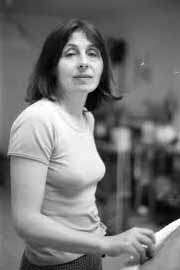Mária Bartuszová
Mária Bartuszová (1936–1996) was a Slovakian sculptor known for her white plaster abstract sculptures.[1]
Mária Bartuszová | |
|---|---|
 | |
| Born | 24 April 1936 Praha, Czech Republic |
| Died | 22 December 1996 (aged 60) Košice, Slovakia |
| Nationality | Slovakian |
| Known for | Sculpture, Ceramics |
| Movement | Abstract art |
| Spouse(s) | Juraj Bartusz |
.jpg)
Biography
Bartuszová was born on 24 April 1936 in Praha (Prague), Czech Republic.[2]
From 1951 through 1955 she studied at the Higher School of Applied Arts in Prague. She went on to study at the Academy of Arts, Architecture and Design in Prague from 1956 through 1961.[3] After her graduation she moved from Prague to Košice, Slovakia with her husband Juraj Bartusz.[4][5]
In 1966 she was included in the Exhibition of the Young at the House of Arts in Brno, Czech Republic, her first recorded exhibit.[6] She was a member of the Concrete art organization, the Concretists' Club (Klub konkrétistů).[7][4] She exhibited her art throughout her life time and posthumously, mostly in Slovakia and the Czech Republic.[6]
Bartuszová died on 22 December 1996 in Košice[2] Her work in included in the Centre Pompidou in Paris and the Slovak National Gallery in Bratislava.[3] Her work is also in the collection of the Tate in London[1] and will be shown in a forthcoming solo retrospective there in 2020.[3]
Characteristics of her Artworks
Mária Bartuszová (1936 – 1996) remains an unknown Slovak sculptor (with Czech descent), her artwork was presented to the general public during Documenta in Kassel in 2007 (curated by Roger M. Buergel, Ruth Noack) – from this position, her works became to appear occasionally in international exhibitions and some of them have become part of prestigious collections of contemporary art. Her artworks have been exhibited individually, without a broader context and with no reference to broader dynamics within her practice. Very first posthumous and important exhibitions are: Path to the Organic Sculpture (2005, Slovak National Gallery), Mária Bartuszová: Provisional Forms (2014-2015, Museum of Modern Art in Warszaw). “A majority of the artist´s sculptures are made of plaster - material by nature preparatory and impermanent.” For this reason alone, despite their perfect shape, her sculptures are as it were by design, tentative, unfinished and transitory. On occasion (mostly financial) when “Bartuszová succumbed to the temptations of using aluminium or bronze, she would immediately undermine their material weight, through either form or subject matter: softening the material, putting it in motion, altering its proportions, and mocking gravity.” “Her artworks between the second half of 60th (20 Century) became more influenced with her individual vision of constructive geometric tendencies connected with new materials such a cutted aluminium. In 1976 and 1983, together with arthistorian G. Kladek, they ran workshops for blind disable and visually impaired children. She created sculptures that enabled those unable to see to get to know various forms and textures, to differentiate between geometric and organic forms”, to recognise their emotional significance, and to develop of art, “alternative” usage, and the emphasis on the haptic characteristics of sculpture, manifest Maria Bartuszová´s strikingly avantgarde approach to her artistic tasks. From the 1980s, her work was dominated by pure, ovoid forms, hollowed eggs and shells, with idealized shapes that had been subjected to deformation – crushing, squeezing, breaking, tying. Visible sign is of oval forms are constrained with string, sometimes weighted additionally with small stones, in which the fragile plaster matter. In the final phase of her creativity (works produced after the mid 1980s), Bartuszová began to employ a singular method of obtaining plaster casts by means of her signature technique, called “pneumatic shaping”.[8]
Public Collections
- Slovak National Gallery in Bratislava, Slovak Republic
- East Slovak Gallery, Košice, Slovak Republic
- Tate Gallery, London
- Muzeum Sztuki Nowoczesnej w Warszawie / Museum of Modern Art Warszava, Poland
- Centre Pompidou / Museé d´ Art Moderne, Paris, France
- Kontakt. Kontakt. The Art Collection of Erste Group and Erste Foundation, Vienna, Austria
- The First Slovak Investment Group’s Collection (PSIS), Slovakia
- Pinault Collection, Venice, Italy
Bibliography
- BAŽANTOVÁ, Viera – KVASNIČKA, Marián. Mária Bartuszová. Trenčín : M. A. Bazovský Gallery, 1983
- Mária Bartuszová - Sculpture Works 1:1962/1987: exhibition catalogue: Exhibition Hall ZSVU Košice - january 1987. Košice: ZSVU, 1988. 63 s.
- BESKID, Vladimír. Mária Bartuszová - Cesta k organickej plastike / The Path to Organic Sculpture (1962-1966): Bratislava: Slovak National Gallery, 2005. ISBN 8080590990.
- DZIEWAŃSKA, Marta (ed.). Provisional Forms. Warszaw : Museum of Modern Art in Warszaw, 2015. ISBN 9788364177262. (including essays by Gabriela Garlatyová, Martina Pachmanová, Anke Kempes, Agata Jakubowska, Briony Fer, Claudia Calirman, Christine Macel, Amanda Sarroff)
- GARLATYOVÁ, Gabriela. Lives of the Artists: Maria Bartuszová. In. Tate Etc.,ISSUE 40 — SUMMER 2017, Publisher Tate Gallery, London.
References
- "Maria Bartuszová 1936-1996". Tate. Retrieved 27 November 2019.
- "Mária Bartuszová". abart. Retrieved 27 November 2019.
- "Maria Bartuszová biography". Alison Jacques Gallery. Retrieved 27 November 2019.
- "Maria Bartuszová. Provisional Forms". Museum of Modern Art in Warsaw. Retrieved 27 November 2019.
- Phaidon Editors (2019). Great women artists. Phaidon Press. p. 52. ISBN 0714878774.
- "Maria Bartuszova Biography". ArtNet. Retrieved 27 November 2019.
- "Mária Bartuszová, The Path to Organic Sculpture". Slovak National Gallery. Retrieved 27 November 2019.
- DZIEWAŃSKA, Marta (ed.) (2015). Provisional Forms (1st ed.). Warszaw: Museum of Modern Art in Warszaw. pp. 1–12. ISBN 9788364177262.CS1 maint: extra text: authors list (link)
External links

- images of Bartuszová's work at Alison Jacques Gallery
Further reading
- Maria Bartuszová. Provisional Forms ISBN 8364177265